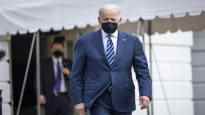In the next phase of the war in Ukraine, opposition to Russia will require controversial decisions. The United States is now expected to take the lead in how to increase pressure against Russia, says ‘s US correspondent Iida Tikka.
WASHINGTON. After the President of the United States Joe Biden visiting Brussels on Thursday, the United States is once again playing its traditional role as leader of the West Front. Europe’s hopeful eyes are once again turning to the movements of the economic and military giant.
Biden is due to attend a meeting of NATO countries first, then a meeting of EU countries.
From Brussels, Biden is still heading to Poland for negotiations and to show his support for the NATO country in Eastern Europe.
Biden’s journey to Europe is the culmination of close diplomacy in recent weeks. The United States has succeeded in building a broad anti-Russian front, thanks in large part to a foreign policy conviction that emphasizes the importance of Biden’s alliances.
However, the impressively quickly decided and strong sanctions were only the first step in the Front’s reaction to the Russian invasion.
The war in Ukraine is escalating and seems to be moving to the next stagewhere Russia is trying to tire Ukraine of resistance with a sheer mass.
It is also forcing the EU and the US to increase the number of rounds – the problem is just how.
The first phase of the resistance had been planned for a long time, and the sanctions were not feared to escalate the war. The next step is for the Western Front to negotiate in real time, and the means are more dangerous than sanctions.
Now Europe is waiting for a new direction from the United States. It will hardly meet the wishes of all countries.
Based on preliminary information about the visit The goal of the United States is to equip its allies for a long and consuming twist.
There are new sanctions on the table in Brussels again. They are intended, for example, to prevent the Russian elite from circumventing the restrictions already imposed, so that sanctions can be lifted as effectively and for as long as possible.
Security Advisor Jake Sullivan According to Biden, it will also publish a plan on how the United States can help Europe secure its energy supply now and in the future.
NATO is due to discuss changes in the composition and number of forces in Eastern Europe, such as the Baltics. According to Sullivan, the changes would be long-lasting.
In practice, therefore, Biden seeks to further strengthen the alliance and ensure that it does not crack over time.
The more difficult part of the discussions concerns how to increase pressure against Russia. Some NATO and EU countries also want military action to end the war.
The Polish prime minister intends to propose a peacekeeping operation in Ukraine at a NATO meeting. The details of the proposal are not yet known. The Baltic countries, on the other hand, want NATO to match Ukraine Volodymyr Zelensky requests and would close the sky over Ukraine.
Both the peacekeeping operation and the no-fly zone are virtually impossible hopes, but they are clear examples of Europe’s desire to do more.
The more Ukrainians die, the more pressure on the United States grows, and the mere maintenance of combat morale is not enough. The same unified concept of justice that glues the Allied front together drives toward stronger action.
In practice, this could mean the first delivery of MiG-29 fighter jets to Ukraine from Poland.
The fighters would offer Ukraine a chance to renew its strategy at the start of the fourth week of the war, before Russia has time to adjust to the current range of means.
The situation is for Biden familiar in advance, but in a different role. Decades ago, he himself was one of those senators who demanded that the United States intervene more strongly in the Bosnian war.
Even then, U.S. action to end the massacre was slowed by concerns about the spread of the war – and Russia’s reaction.
This time the concern is much more serious, a direct war with Russia. On the other hand, failure to stop the war is a bitter defeat.
As Washington’s foreign policy professionals tend to say when U.S. actions in the world are criticized: Damned if you do, Damned if you don’t.
You are either doing too much or not enough.
